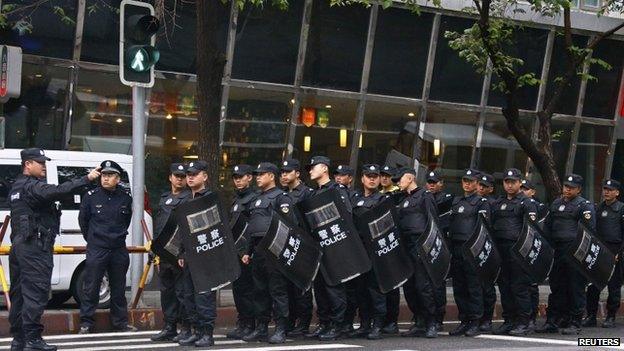China media: Xinjiang attack
- Published

Security has been tightened in Xinjiang after Thursday's attack
Papers call for "unity" in China's "fight against terrorism" after the latest violent attack in Xinjiang.
Attackers in the restive region, which is home to the Muslim Uighur minority, crashed two cars into shoppers at a market on Thursday, killing 31 people.
China's Ministry of Public Security has called it a "violent terrorist incident".
State-run papers, including People's Daily, external and the Liberation Army Daily, external, have condemned the attack in their front-page commentaries.
"The terrorists have carefully chosen the timing to harm the innocence to instil fear, gain attention and to pressurise the party and the government. However, the increased number of such attacks shows the terrorists are reaching their end," says an article in the People's Daily, external.
The Xinjiang Daily, external calls for unity in the autonomous region to "fight the terrorists with determination" and "maintain social stability and harmony".
Ma Pinyan, a senior anti-terrorism researcher, tells the China Daily, external that more people have turned to extremism because "enough efforts are not being made to solve terrorism at its roots".
The Global Times, external notes that "policy errors in the course of history partly contributed to the current plight", and calls for "unity" to tackle the problem.
"We lack experience in cracking down on violent terrorism in today's highly open era. However, unity and action constitute the basic experience we need," it says.
Meanwhile, the China Central Television, external reports that the White House has condemned the "terrorist" attack.
"In the past two years, the US had refused to label attacks in China as acts of terrorism. However, when its allies such as the UK and Spain were hit with similar assaults, Washington was quick to call them as acts of terrorism… This is the first time the US has acknowledged the Xinjiang attack as an act of terror," a news presenter says.
Elsewhere, papers criticise Vietnam for "seeking to form an alliance with the Philippines" to "challenge China" over the territorial dispute.
The Philippines, Brunei, Malaysia, Vietnam and Taiwan all have overlapping claims with China in the South China Sea.
Tensions have escalated in recent days. Anti-China riots broke out in Vietnam last week after Beijing decided to bring in an oil drilling rig into disputed waters.
The Philippines is taking China to a UN court over its territorial claims. Local media outlets report that Vietnam might "follow the Philippines" to pursue legal action against China.
Li Guoqiang, a historian at the Chinese Academy of Social Sciences, tells the China Daily , externalthat Hanoi and Manila tend to perceive China as a "common opponent", but they are unlikely to form an "anti-China coalition" because such a move "will risk great damage to their ties with China".
Echoing similar sentiments, Wu Shicun, president of the National Institute for South China Sea Studies, tells the Global Times, external the leaders of Vietnam and the Philippines are trying to find some "common language" on the South China Sea issue.
"However, an anti-China political alliance between Vietnam and the Philippines is almost impossible which goes against the reality and future between China and ASEAN countries," he says.
IT regulations
And finally, media and experts discuss the impact of proposed IT regulations on Internet users.
According to local media reports, external, the State Internet Information Office is planning to impose security checks on information technology products and services "related to national security and the public interest".
Products and services that do not meet the requirements will not be permitted for use in China, it says.
This step has been taken to "safeguard national cyber-security and to protect the legal interests of Chinese users", reports say.
The latest announcement comes after China banned the use of Microsoft's latest operating system on government computers.
Ni Guangnan, an academic at the China Academy of Engineering, tells the Beijing Youth Daily, external that the new regulation will provide the opportunity for local companies to "replace foreign technical products and services".
Liu Duo, a telecommunications expert, dismisses concerns that the review will affect China's netizens.
"The security checks will only target IT products and services, so net users posting articles and information will not be affected," he tells the daily.
BBC Monitoring, external reports and analyses news from TV, radio, web and print media around the world. For more reports from BBC Monitoring, click here. You can follow BBC Monitoring on Twitter, external and Facebook, external.